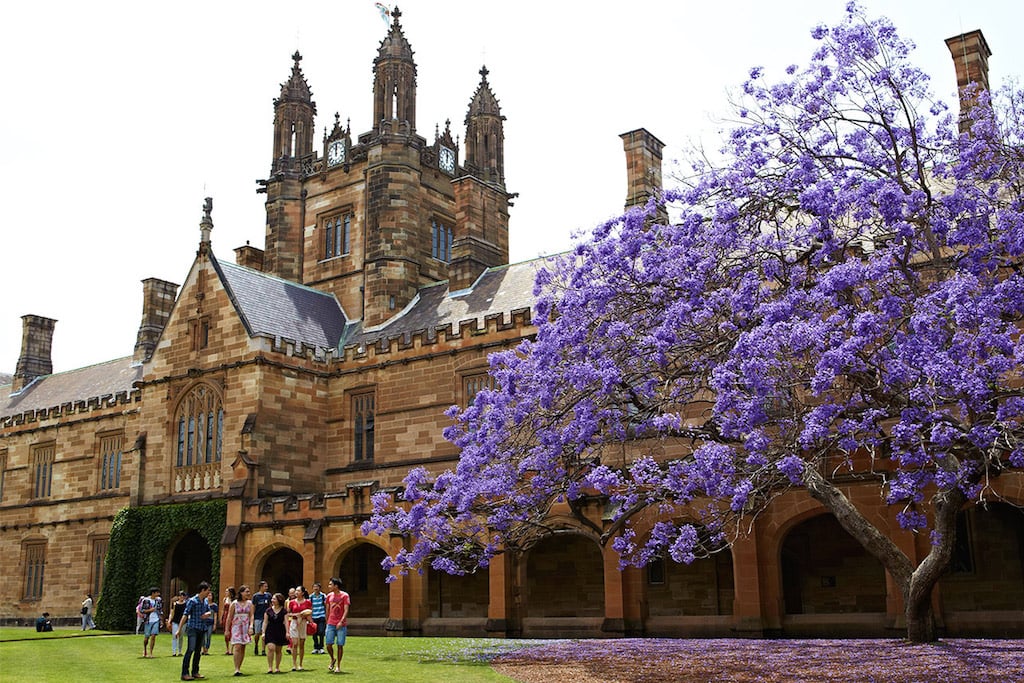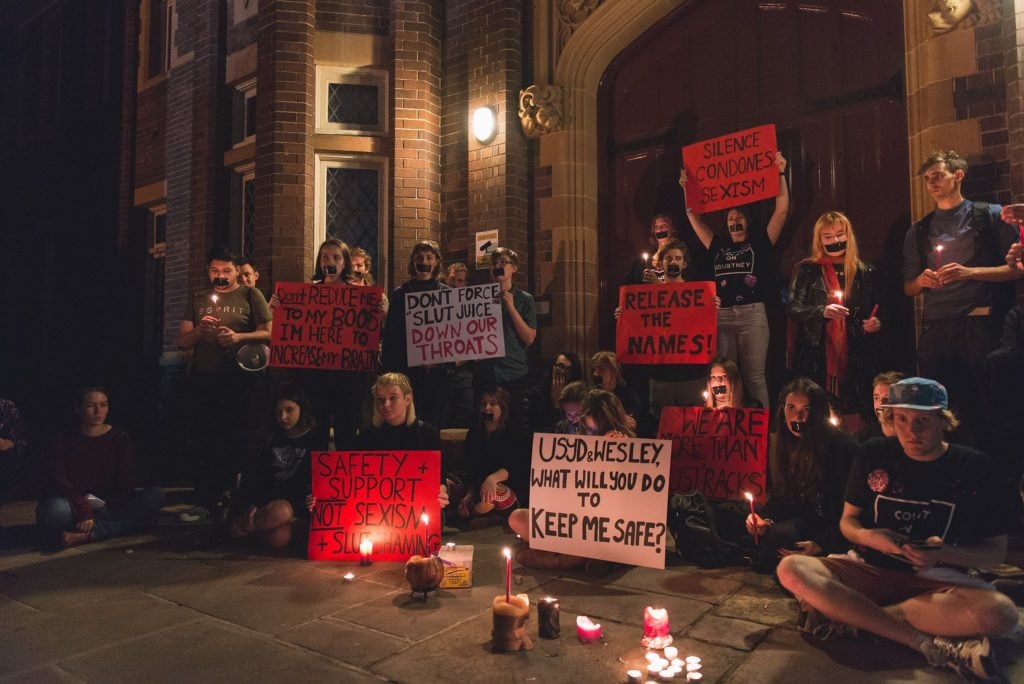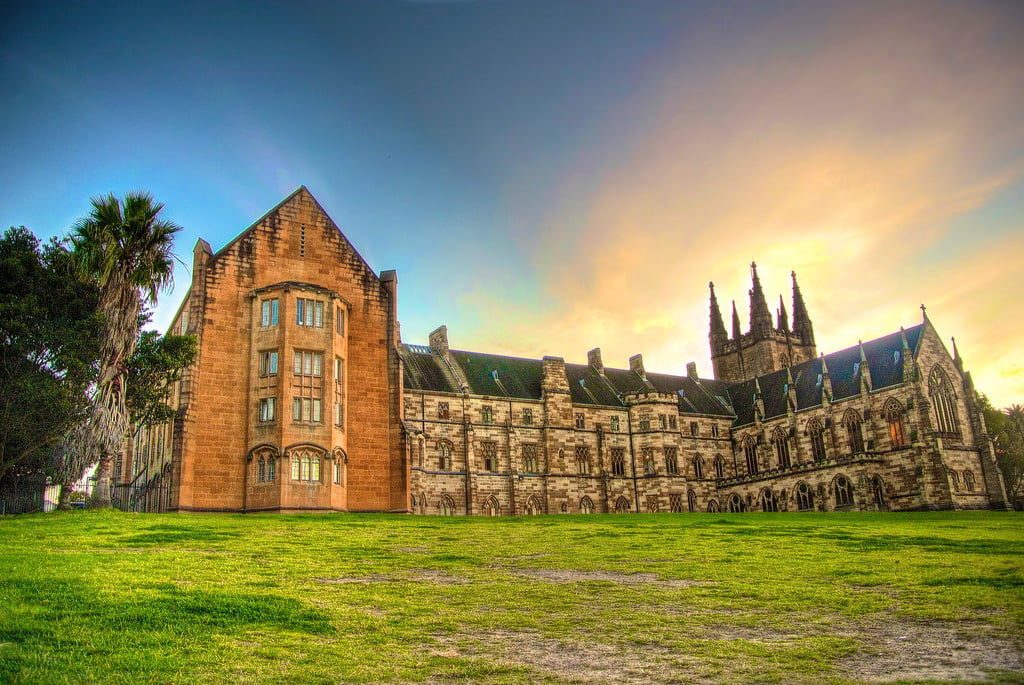Exclusive University Colleges Are Just Playgrounds For The Rich And It’s Time We Shut Them Down
Why are we wasting uni housing on those who need it the least?

Right now dozens of students are wandering around the University of Sydney’s Camperdown campus dressed in formal academic robes while carrying bricks.
It’s part of an O-Week initiation ritual at St Andrew’s, one of the oldest and most elite university colleges in Australia. It was established in 1867 by an Act of Parliament and like most Sydney Uni colleges, it’s situated on Crown land, in one of Sydney’s most expensive and highly sought after inner-city suburbs.
The O-Week tradition of carrying around a brick all day goes back years, and it’s a relatively innocuous (if deeply weird) ritual as far as colleges go. In 2012 another Sydney Uni college, St John’s, suspended 30 students after an O-Week drinking event resulted in the hospitalisation of a female student.
If you’re a prospective Sydney Uni student who wants to experience everything a college like St Andrew’s has to offer, including the joy of lugging around a brick all day, it’s easy enough to get in. All you need to do is fill out an application form, write a personal statement and attach a couple of references. Oh, and fork out $34,000 for a year’s accomodation.
The release of a new report yesterday detailing various examples of sexual assault and hazing rituals at colleges across Australia has reignited debate around college culture. Last year’s Broderick report found one-in-three women living at Sydney Uni colleges had experienced sexual harassment. Some activists have called for “wholesale transformation” of college culture.
But there’s a bigger question to be asked. Why do colleges that cater almost exclusively to the rich, and are founded on a legal and ethical framework from 150 years ago, still exist?

Who Goes To College?
Unlike in the US, where a majority of students experience life in residential colleges at some point, Australian students very rarely live on-campus. According to the Australia Bureau of Statistics less than 5 percent of uni students live on-campus, with the rest either living with their parents, their partner or in a share house.
Despite the recent focus on college culture, there actually isn’t that much granular data on the demographic makeup of college students. There are overall statistics that show, for example, college students are more likely to be male and less likely to speak a language other than English — but those surveys lump together students studying at regional campuses like the University of New England and University of Wollongong with those living at St Andrew’s and St John’s.
When we know regional universities have a higher proportion of students from disadvantaged backgrounds than elite institutions like the University of Sydney, University of Adelaide, University of Queensland and University of WA, those overall figures don’t help much. Plus, the fact that a year’s accomodation at the University of New England costs less than $10,000, compared to the $30,000 of most Sydney Uni colleges suggests we’re talking about a very different cohort of students.
Elite, Expensive Colleges Are For The Rich, Not Those Who Need Housing
A study conducted by the University of Sydney, looking specifically at the culture of its colleges, found concern that the college community was skewed too heavily towards students from private schools in Sydney.
“A further theme that emerged… in the Survey was that some Colleges tend to draw a large proportion of students from a relatively small pool of Sydney schools which can impact on the ability of those who did not attend those schools to ‘fit in'”, the study said.
“I found that many people here came from Sydney private schools and they all had connections and knew each other and so not coming from a private school, I found it a little difficult to fit in at first,” one student said.
As someone who wasted far too much of their university life on student politics, I was lucky (or unlucky) enough to travel to most of Australia’s 40 universities. One thing that always stood out to me was how different college demographics were at different universities.
At the big sandstone universities (like Sydney, Adelaide and UWA), the colleges tended to be dominated by local students from local private schools, the result of high fees, an old, static culture, and an application process that encourages students to mention if their parents attended the college.
With a housing affordability crisis squeezing young people, particularly in the suburbs adjoining inner-city universities, it’s pretty galling to see colleges, sitting on rent-free public land, servicing the needs of private school kids from wealthy backgrounds.
Why should prime accomodation be reserved for students from Riverview, Sydney Grammar and Scot’s College, who live in the Eastern Suburbs and North Shore — a stone’s throw from Sydney Uni?
Even if you ignore the criticisms of college culture, on a purely practical level the current situation is an obscene misuse of resources. These elite colleges are an anachronism. They’re a legacy of an era when university was the sole domain of the ruling class.
While university access has improved, the archaic structures underpinning the colleges haven’t. In many instances the colleges are still governed by legislation written 160 years ago.
If universities and governments were willing they could rewrite the rules, send the rich kids back to their parent’s mansion in Vaucluse, and prioritise college dorms for students that needed them the most. The concept of university housing being made available to those who need it, not those who want to use it to recreate their colonial fantasies, is hardly radical.
Abolishing The Colleges As We Know Them Won’t Fix Everything, But It’s A Start
Reclaiming the colleges for the many, not the few, won’t make issues around harassment, assault and bullying magically disappear. Universities, college administrators and students have a lot of work to do to stamp out those problems – and they aren’t just isolated to the wealthy colleges.
But there is something particularly toxic about the culture at the most elite institutions. Students with experience of the worst these colleges have to offer regularly point to the “private school boy” culture of entitlement that drives some of the worst behaviour.
The only college to boycott the Broderick review was St Paul’s, the oldest, and by some measures the most exclusive, college in Australia. It’s also the college most regularly accused of misconduct. It’s clear there’s a problem where some of these colleges think they play to a different set of rules, and that culture appears to be filtering down to the students.
The question is why have universities and government’s let them get away with it for so long?
There are no good reasons why we should continue to house the scions of the ruling class in public university colleges, but there’s plenty of evidence to back up the idea that we should replace them with students that actually need housing and support. Let’s just do it.
—
Article image via University of Sydney website
